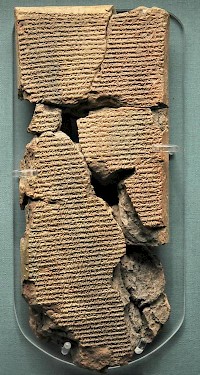Gyges of Lydia
Q312537Gyges: first king of the Mermnad dynasty. His reign lasted from ca.680 to 644.

In the first decade of the seventh century BCE, the old kingdom of Phrygia was overthrown by a nomadic tribe that was called Cimmerians. The famous king Midas had once been able to repel them, but in 696/695, there was no such help. After a lost battle, Midas appears to have committed suicide. His capital Gordium was destroyed, and the central government collapsed. Military leaders who were able to offer protection to a region started to create small kingdoms of their own.
One of them was a man named Gyges, the founding father of Lydia. Hardly anything is known about his rise to power, which became the stuff that tall stories are made of. The Greek researcher Herodotus of Halicarnassus, who wrote two centuries after the death of Gyges, tells in the first book of Histories that Lydia was once ruled by a man named Candaules or Myrsilus, and that his wife ordered Gyges to kill the king. (Candaules' real name was Sadyattes.) One century later, the philosopher Plato invented a fantastic tale about Gyges' ring, which made him invisible and allowed him to seize power. An even later author, Plutarch of Chaeronea, informs us that a Carian prince named Arselis of Mylasa helped Gyges. This is, at least, not an unbelievable story, and is to a certain extent confirmed by the close ties that existed between Lydia and Caria.
The new king of Lydia had nothing to fear from the east, where he defeated the Cimmerians in 679. Now, Gyges could embark upon a western policy, where several Greek towns were situated on the eastern shore of the Aegean Sea. In vain, Gyges attacked Miletus and Smyrna, but he was able to capture Colophon, which gave Lydia its first port. The Troad seems to have been subdued as well. For a century, its capital Adramyttium was to be the Lydian's crown prince's apanage.
From now on, Lydia and Greece had contact. Gyges initiated the policy that was to continue for more than a century: while attacking the Greek towns in Asia, he gave lavish presents to the sanctuaries at the mainland:
He sent a number of presents to the shrine at Delphi; indeed, most of the silver there came from him, and in addition he presented a vast number of vessels of gold of various kinds, the most noteworthy being six golden mixing bowls. [Herodotus, Histories 1.14; tr. Aubrey de Selincourt]
The result was that the god of the oracle discouraged the Greek towns in the mother country to support the Asian Greeks. It was one of Gyges' many political uses of gold and silver, which was conveniently found in the river Pactolus near Sardes. Archaeologists have shown that during the second quarter of the seventh century, i.e. during the reign of Gyges, Sardes became an impressive city with real houses, covered with roof tiles. (Herodotus' remark that they were made of reed and had thatched roofs is certainly wrong.)
So, Gyges' reign started successfully. Assyrian sources indicate that he was also responsible for a treaty with the new pharaoh of Egypt, Psammetichus I (664-610). It is certain, however, that Greek and Carian mercenaries supported Psammetichus when he became king and expelled the Assyrian garrison.
The strongest argument against an Lydo-Egyptian treaty is that Gyges needed Assyria and could not afford to support one of its enemies. A generation after the Cimmerians had destroyed Gordium, they returned. Gyges was now forced to appeal to king Aššurbanipal (668-631) for help. The Assyrian ruler says:
Gyges' rider set out [...]. He reached the border of my country. My men spotted him and asked him: "Who are you, stranger, you, whose country's rider never traveled the road to the frontier?" They brought him [...] to Nineveh, my royal city, into my presence. But of all the languages of east and west, over which the god Aššur has given me control, there was no interpreter of his tongue. His language was foreign, so that his words were not understood.note
In spite of these linguistic difficulties, a treaty was concluded and after Gyges had paid tribute, the Assyrians and Lydians jointly fought against the Cimmerian mounted archers. On one occasion, Gyges sent prisoners of war to Aššurbanipal.
In 644, however, things went seriously wrong. A Cimmerian army, commanded by a man named Lygdamis (Dugdammê), defeated the Lydian army, captured the lower town of Sardes, and continued to the west, where he looted the Greek towns. Gyges was killed. When Lygdamis returned to the east, he was defeated by the Assyrians.
Although the Cimmerian invasion had been bloody and destructive, Gyges' kingdom survived. His son Ardys succeeded him, and the founder of the Lydian monarchy was buried on the plain of Sardes at the Lydian royal cemetery at Bin Tepe.
This is about everything we know about Gyges. In fact, we do not even know his name, because Gyges may be a rendering of the Luwian word hûha, 'grandfather', which looks like a title. Several biblical scholars have argued that Gyges is behind the figure of Gog, ruler of Magog, who is mentioned by Ezekiel and in the Book of Revelation. At least one Greek tragedy was called Gyges. According to the Roman author Pliny the Elder, Gyges invented all ball games.